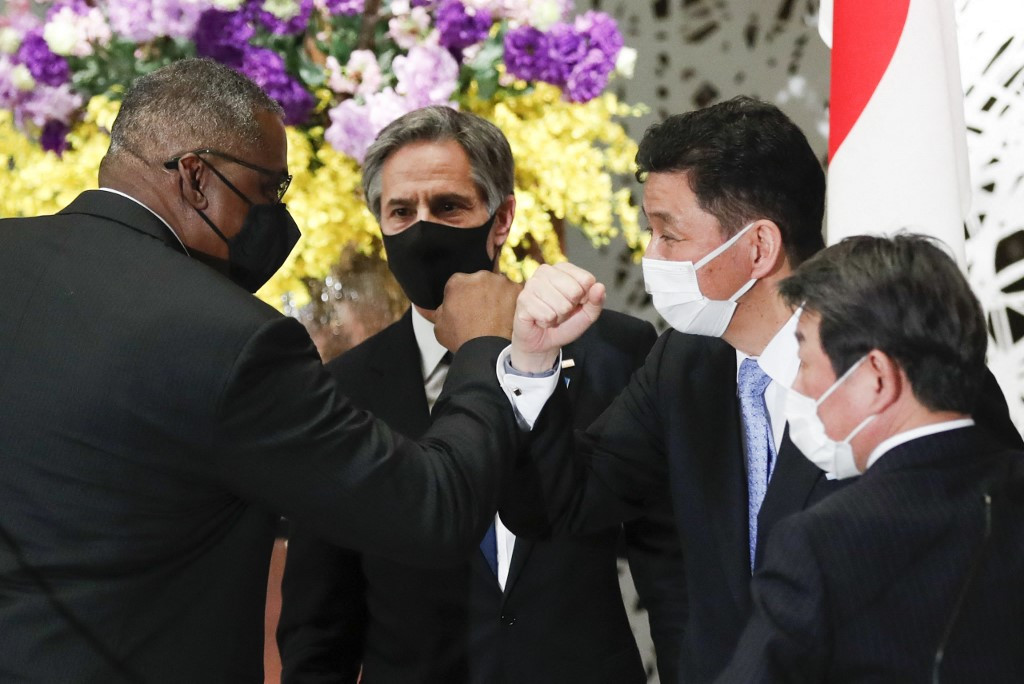Popular Reads
Top Results
Can't find what you're looking for?
View all search resultsPopular Reads
Top Results
Can't find what you're looking for?
View all search resultsJapan, US express "serious concerns" over China coast guard law
"The United States and Japan remain opposed to any unilateral action that seeks to change the status quo or to undermine Japan's administration of these islands," the ministers said in a joint statement issued after their security talks in Tokyo in reference to the group of uninhabited islets.
Change text size
Gift Premium Articles
to Anyone
 US Secretary of State Antony Blinken and Defense Secretary Lloyd Austin leave after their joint press conference with Japan's Foreign Minister Toshimitsu Motegi and Defence Minister Nobuo Kishi after their 2+2 meeting at Iikura Guest House in Tokyo on March 16, 2021.
(Agence France Presse/KIM KYUNG-HOON )
US Secretary of State Antony Blinken and Defense Secretary Lloyd Austin leave after their joint press conference with Japan's Foreign Minister Toshimitsu Motegi and Defence Minister Nobuo Kishi after their 2+2 meeting at Iikura Guest House in Tokyo on March 16, 2021.
(Agence France Presse/KIM KYUNG-HOON )
T
he foreign and defense ministers of Japan and the United States expressed Tuesday "serious concerns" about a Chinese law that took effect recently enabling its coast guard ships to fire on vessels around the Beijing-claimed Senkaku Islands in the East China Sea.
"The United States and Japan remain opposed to any unilateral action that seeks to change the status quo or to undermine Japan's administration of these islands," the ministers said in a joint statement issued after their security talks in Tokyo in reference to the group of uninhabited islets.
US Secretary of State Antony Blinken and Defense Secretary Lloyd Austin, making the first Cabinet-level overseas trip under President Joe Biden's administration, visited Japan to hold a so-called two-plus-two meeting with Japanese Foreign Minister Toshimitsu Motegi and Defense Minister Nobuo Kishi.
It is rare for a joint statement by the two countries to single out China, a sign that Tokyo and Washington have raised their alert level over the threat Beijing poses militarily and economically and to its violations of human rights.
The coast guard law implemented Feb. 1 raised concerns in Japan as Chinese coast guard vessels have repeatedly intruded into Japanese waters around the islets in an apparent attempt to undermine Tokyo's control.
The statement also explicitly laid out that the Senkaku Islands fall within the scope of Article 5 of the bilateral security treaty, meaning the United States would come to Japan's defense in the event of a conflict there.
Japan and the United States also reiterated their objections to "China's unlawful maritime claims and activities in the South China Sea," the statement said.
Following the two-plus-two meeting, the first of its kind since April 2019, the US secretaries will meet with Japanese Prime Minister Yoshihide Suga. The premier has been invited to the White House in the first half of April, when he is set to become the first foreign leader to hold talks with Biden in person.
In the two-plus-two talks, the ministers also shared "serious concerns" regarding the human rights situation in Hong Kong and China's far-western Xinjiang region, where the Muslim Uyghur minority lives.
The ministers reaffirmed their commitment to denuclearization of North Korea and urged Pyongyang to abide by its obligations under UN Security Council resolutions.
The Biden administration is currently conducting, in consultation with Japan and South Korea, a "thorough" review of US policy toward the reclusive nation that is expected to be completed in "the coming weeks," according to a senior State Department official.
After visiting Japan, Blinken and Austin will travel to Seoul on Wednesday for talks with their South Korean counterparts.
Following the two-nation Asian tour, Blinken is scheduled to meet with Yang Jiechi, a member of the Communist Party of China's Political Bureau and the country's top foreign policy official, and Chinese Foreign Minister Wang Yi in Alaska on Thursday.
The Alaska meeting will be the first in-person contact between senior officials of the two countries since the Biden administration took office.









